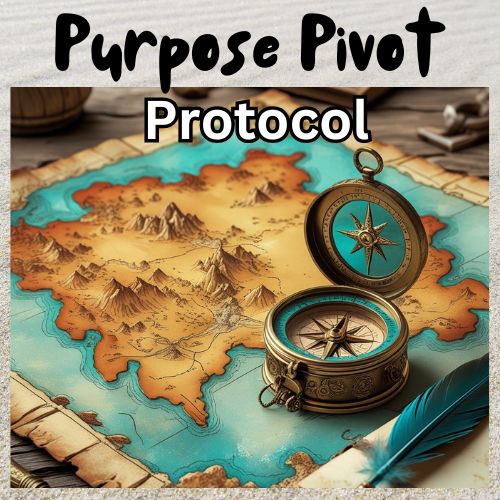Summary
In our achievement-obsessed culture, we’re conditioned to believe that being the smartest person in the room equals success. But here’s the uncomfortable truth: intelligence without purpose is like a Ferrari without a destination—impressive, but ultimately pointless. Understanding why you’re in the room—your unique contribution, your authentic voice, your deeper purpose—transforms you from a passive observer trying to prove your worth into an active participant creating meaningful impact. This shift from ego-driven performance to purpose-driven presence doesn’t just change how others see you; it revolutionises how you see yourself.
Introduction
Picture this: You’re in a meeting, boardroom, or social gathering, mentally cataloguing everyone’s credentials, comparing your achievements to theirs, calculating whether you’re the smartest person present. Sound familiar? Welcome to the exhausting Olympics of intellectual one-upmanship that most of us didn’t realise we’d entered.
I’ve discovered that the people who create the most meaningful impact aren’t necessarily the ones with the highest IQ or the most impressive résumé. They’re the ones who understand exactly why they’re in the room.
This isn’t about dumbing yourself down or playing small. It’s about something far more radical: shifting from trying to be the most impressive person in the room to being the most useful one.
The Story of Gregory Hanson
Gregory Hanson adjusted his wire-rimmed glasses for the third time in ten minutes, the metallic click echoing in the mahogany-panelled boardroom that smelled faintly of leather and ambition. The quarterly strategy meeting at Henderson & Associates stretched before him like an intellectual battlefield, and he was armed with every statistic, market analysis, and competitive insight he’d spent the weekend memorising.
As the newest partner at thirty-two, Gregory felt the familiar knot in his stomach—that acidic cocktail of imposter syndrome and perfectionism that had powered him through Harvard Law, through the gruelling associate years, through every promotion he’d clawed his way toward. The morning coffee turned bitter on his tongue as he watched his colleagues file in: Marcus with his Stanford MBA and corner office confidence, Sarah, whose client retention rates were legendary, and David, who could quote case law like poetry.
The mahogany table reflected the fluorescent lights like a mirror, and Gregory caught glimpses of his anxious expression in its polished surface. He straightened his shoulders, smoothed his charcoal blazer, and prepared to prove—once again—that he deserved to be here.
“Let’s discuss the Morrison acquisition,” announced James Henderson, the silver-haired managing partner whose voice carried the weight of three decades in corporate law. Gregory’s heart quickened. He’d prepared for this—spent hours analysing comparable deals, memorising financial projections, crafting arguments that would showcase his analytical prowess.
Marcus launched into his assessment, rattling off numbers with the precision of a human calculator. Sarah followed with market positioning insights that drew approving nods around the table. David presented legal precedents with the fluency of someone who’d never met a law library he couldn’t conquer.
Gregory’s moment arrived. He cleared his throat, the sound sharp in the room’s expectant silence, and began his presentation—a masterful display of research and analysis that would have impressed any professor. The words flowed like a well-rehearsed performance, each data point carefully chosen to demonstrate his intellectual firepower.
But as he spoke, he noticed something unsettling in the room’s energy. People were listening politely, but there was a flatness to their attention, like the difference between applause and genuine appreciation. The air conditioning hummed with mechanical indifference while Gregory’s perfectly prepared arguments seemed to dissolve into the filtered air.
Then Henderson asked the question that changed everything: “That’s impressive analysis, Gregory. But tell me—what does your gut say? What story is Morrison’s leadership team really telling us?”
The room fell silent. Gregory felt heat rise to his cheeks as he realised he had no answer. Not because he lacked intelligence or preparation, but because he’d been so focused on proving he was the smartest person in the room that he’d forgotten why he was actually there.
In that moment of uncomfortable silence, the scent of fresh coffee from Henderson’s cup seemed to sharpen his awareness. He looked around the table—really looked—and saw something he’d missed in his anxious preparation. These weren’t his competitors in some intellectual Olympics. They were his teammates, each bringing different strengths to solve complex problems for real clients with real stakes.
“I…” Gregory began, then stopped. The truth tasted foreign on his tongue. “I honestly don’t know. I’ve been so focused on the numbers that I haven’t thought about the human story underneath them.”
Instead of the judgment she expected, she saw something surprising in her colleagues’ faces: relief. Even recognition.
Marcus leaned forward, his usual competitive edge softened. “You know what? I’ve been thinking the same thing. All my market analysis feels hollow without understanding what’s really motivating Morrison’s CEO.”
Sarah nodded, her fingers drumming thoughtfully on the polished wood. “The retention metrics are concerning, but I keep wondering—what aren’t they telling us about company culture?”
For the next hour, the room transformed. Instead of individual performances designed to impress, genuine collaboration emerged. Gregory found himself contributing not brilliant analyses, but thoughtful questions that sparked deeper investigation. He realised her unique value wasn’t being the smartest person present—it was being someone who could sense the human dynamics beneath the corporate structures, who could ask the questions others were too busy posturing to consider.
The Morrison deal ultimately fell through, but for reasons they’d never have uncovered in their original approach. The due diligence revealed cultural challenges that would have made integration nearly impossible—insights that emerged only when the team stopped trying to outsmart each other and started working together toward genuine understanding.
Later that afternoon, Henderson stopped by Gregory’s office. The late sunlight streamed through his windows, casting warm rectangles across his desk, scattered with notes from the morning’s breakthrough session.
“That was good work today,” he said, settling into the chair across from Gregory’s desk. “You know what made the difference?”
Gregory shook his head, genuinely curious.
“You stopped trying to prove you belonged in that room and started being the reason you belonged there.” He smiled, the expression crinkling the corners of his eyes. “Intelligence is common. Wisdom about when and how to use it? That’s rare.”
As Henderson left, Gregory sat in his office as the afternoon light shifted to golden hour. For the first time in months, his shoulders relaxed completely. The familiar knot in his stomach had dissolved, replaced by something he hadn’t felt since law school: genuine excitement about the work itself, rather than about proving his worth through the work.
He picked up his phone and called his mentor from law school, Professor Martinez, whose wisdom had guided him through countless challenges.
“I think I finally understand something you tried to teach me years ago,” Gregory said when Martinez answered. “About the difference between being smart and being wise.”
Martinez chuckled, the sound warm and familiar across the phone line. “Tell me.”
“Being smart is about what you know. Being wise is about knowing why that knowledge matters—and when it doesn’t.”
Five Key Takeaways
1. Purpose Transforms Performance from Anxiety to Impact
When you understand why you’re in the room, your contributions shift from anxious self-promotion to authentic value creation. You stop performing your intelligence and start using it strategically. This transformation reduces stress while increasing effectiveness—a win-win that benefits both you and everyone around you.
2. Questions Are Often More Valuable Than Answers
Gregory’s breakthrough came not from providing brilliant analysis, but from asking the questions others were too busy posturing to consider. In many situations, the person who can identify what’s missing, what’s unspoken, or what assumptions need challenging provides more value than the person with the most facts.
3. Collaboration Beats Competition Every Time
When you’re focused on being the smartest person in the room, you’re inherently competitive with everyone around you. When you’re focused on fulfilling your purpose, you become naturally collaborative. This shift transforms team dynamics and dramatically improves outcomes.
4. Authenticity Is Your Unique Competitive Advantage
Your authentic perspective, shaped by your unique experiences and insights, is something no one else can replicate. When you stop trying to be impressive and start being genuinely useful, you discover strengths you didn’t know you had.
5. Wisdom Knows When to Shine and When to Listen
True intelligence includes knowing when to speak and when to stay quiet, when to lead and when to follow, when to share knowledge and when to ask questions. This discernment—not raw brainpower—is what creates lasting impact.
The Room Audit
Before your next important meeting or gathering, ask yourself:
- Why was I invited to be here?
- What unique perspective do I bring that others might not have?
- What question am I uniquely positioned to ask?
- How can I help this group achieve its goals?
- What would success look like for everyone involved, not just me?
“The greatest enemy of knowledge is not ignorance, it is the illusion of knowledge.” — Stephen Hawking
“I was gratified to be able to answer promptly, and I did. I said I didn’t know.” — Mark Twain
Further Reading
- “The Gifts of Imperfection” by Brené Brown – About embracing authenticity over perfectionism
- “Presence: Bringing Your Boldest Self to Your Biggest Challenges” by Amy Cuddy – How authentic presence transforms performance
- “The Wisdom of Crowds” by James Surowiecki – Why collective intelligence often surpasses individual brilliance
- “Humble Inquiry” by Edgar Schein – The art of asking questions and building relationships
Frequently Asked Questions About Being the Smartest
Q: Doesn’t focusing less on being smart risk making me appear incompetent? A: Actually, the opposite is true. When you focus on purpose rather than performance, you make more strategic contributions that demonstrate genuine competence. People remember those who helped them think more clearly, not those who tried hardest to impress them.
Q: How do I know what my unique purpose is in different situations? A: Start by asking yourself what drew others to include you. What perspective, experience, or skill set do you bring that’s different from others? Your purpose often lies at the intersection of what you’re naturally good at and what the situation actually needs.
Q: What if I’m genuinely the most knowledgeable person in the room? A: Then your purpose might be to teach, to ask questions that help others grow, or to create space for different types of intelligence to emerge. Knowledge without wisdom about how to use it constructively can actually hinder group progress.
Q: How can I overcome the habit of comparing myself intellectually to others? A: Practice shifting your attention from internal scorekeeping to external contribution. Before entering any room, set an intention about how you want to serve the group’s goals rather than how you want to appear. This takes practice but becomes natural over time.
Q: Can this approach work in highly competitive environments? A: Yes, often even more effectively. Competitive environments are full of people trying to outsmart each other. Someone who focuses on genuine problem-solving and collaboration often stands out precisely because they’re not playing the comparison game.
Conclusion
The most successful people I’ve worked with over two decades of coaching share one crucial trait: they understand that their value isn’t determined by being the smartest person in the room, but by knowing exactly why they’re there and how to contribute meaningfully.
This shift from ego-driven performance to purpose-driven presence is simultaneously simple and revolutionary. It requires nothing more than a fundamental reorientation of attention—from internal scorekeeping to external contribution. Yet it changes everything: how you show up, how others respond to you, and most importantly, how you feel about yourself.
Gregory Hanson’s story isn’t unique. I’ve seen this transformation countless times during retreats. The moment someone stops trying to prove their intelligence and starts using it purposefully, they discover a kind of professional and personal satisfaction that no amount of intellectual one-upmanship can provide.
Your intelligence is a tool, not an identity. Your knowledge is a resource, not a trophy. Your insights are gifts to share, not weapons to wield. When you understand why you’re in the room, you transform from someone who needs to prove their worth into someone whose worth is self-evident through their contributions.
The next time you find yourself in a room full of impressive people, resist the urge to mentally calculate your intellectual ranking. Instead, get curious about why you’re there, what unique value you bring, and how you can help everyone—including yourself—succeed.
Trust me: the room is waiting for what only you can offer.
If this resonates with you and you’re feeling called to deeper reflection and renewal, consider joining me for a transformational walking retreat on the Camino de Santiago in the beautiful southwest of France. These intimate gatherings combine the ancient wisdom of pilgrimage with modern insights about purpose, authenticity, and stress relief. Sometimes the best way to understand why you’re in the room is to step outside of it entirely, breathe deeply, and remember who you really are.
Learn more about upcoming retreats.

10 Powerful Life Lessons Learned While Walking the Camino de Santiago – a free guide filled with 10 not just “quaint anecdotes” or Instagram-worthy moments (though there are plenty of those) but real transformations from real people who walked the same insight-giving trail you might want to walk one day – Subscribe to my monthly newsletter to Download the Guide

The Purpose Pivot Protocol – drawing inspiration from the Camino de Santiago, this transformative course guides you through a proven framework to recalibrate your authentic purpose and create a meaningful and fulfilling next act. Get immediate access

“I am an experienced medical doctor – MBChB, MRCGP, NLP master pract cert, Transformational Life Coach (dip.) Life Story Coach (cert.) Stress Counselling (cert.) Med Hypnotherapy (dip.) and EAGALA (cert.) I may have an impressive number of letters after my name, and more than three decades of professional experience, but what qualifies me to excel at what I do is my intuitive understanding of my clients’ difficulties and my extensive personal experience of managing major life changes using strategies I developed over many years.” Dr M Montagu

